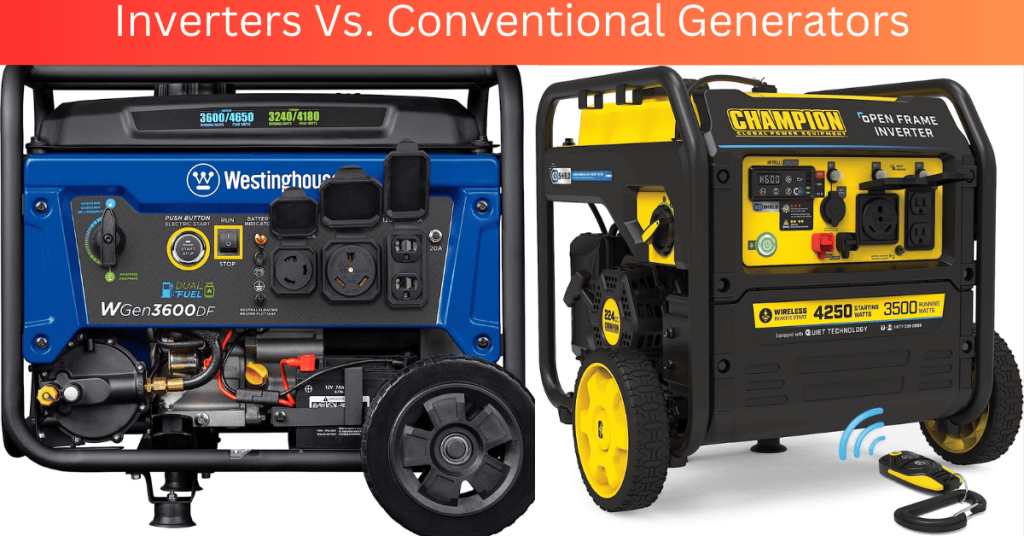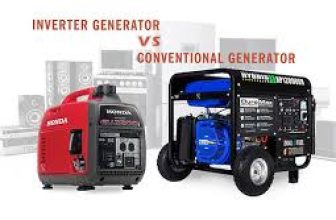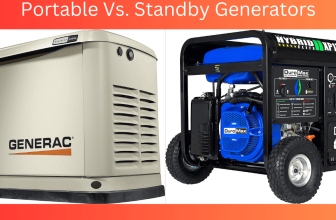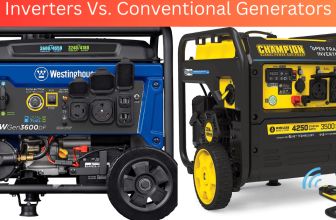Are you trying to decide between an inverter or a conventional generator? With so many options and features, it can be overwhelming! But don’t worry – with the right information and advice, you can make the best choice for you.
In this article, we’ll explore the differences between inverters and conventional generators to help you find out which one is right for your needs.
Let’s dive in!

What Is An Inverter Generator?
I’m sure you’ve heard a lot of talk about inverter generators and conventional generators. But do you know what each one is?
In this section, I’ll explain what an inverter generator is and how it works so that you can decide which type may be right for you.
An inverter generator is a special type of generator that uses advanced technology to produce power. It takes in DC (direct current) electricity from a battery or generator and then converts it into AC (alternating current) electricity. This makes the electricity more powerful and reliable than other types of generators.
Inverter generators also run quieter than most traditional generators and are more fuel-efficient, making them ideal for campers and RVers who want to save money on fuel costs. Inverter generators also come with safety features like overload protection and low oil shut-off, which help protect your equipment from damage due to high voltage or improper use.
They’re also portable, lightweight, and easy to move around if needed. With all these advantages, it’s no wonder why many people choose an inverter generator for their power needs.
Now that you know what an inverter generator is, let’s take a look at what a conventional generator has to offer.
What Is A Conventional Generator?
Well, now that you know what an inverter generator is, let’s move on to conventional generators.
A conventional generator is a type of power generator which uses gasoline, diesel, or other fuel sources to generate electricity. It works by using an internal combustion engine to turn a shaft connected to an alternator, which then produces electricity.
Unlike inverter generators, conventional generators produce electricity in one consistent voltage regardless of the load. This makes them less efficient and more prone to damage due to overloading or underloading.
In addition, they require manual operation for start-up and shut-down as opposed to inverter generators which are equipped with automatic start-up and shut-down features.
Conventional generators are heavier than inverter generators and require regular maintenance in order to keep them running effectively and efficiently. They also tend to be louder than inverter generators due their internal combustion engines running at a higher RPM when producing power.
Now that we’ve looked at the differences between an inverter and conventional generator, let’s take a look at the advantages of inverter generators.
Advantages Of Inverter Generators
If you’re looking to power your home, camping trips, or any other activity, you may be wondering if an inverter generator or a conventional generator is the right choice for you. Let’s take a look at some of the advantages of inverter generators.
The table below summarizes the key benefits of inverter generators:
| Advantages | Inverters | Conventional Generators |
|---|---|---|
| Quiet Operation | Yes | No |
| Fuel Efficiency | Yes | No |
| Portability & Weight | Yes | No |
| Clean Power Outputs (THD) that are safe for sensitive electronics and tools. | Yes | No |
An inverter generator is quieter than a conventional generator and runs on less fuel due to their advanced engine design and air intake system. They also tend to be more lightweight than conventional generators, making them easier to transport. Additionally, inverters produce clean power outputs that are safer for sensitive electronics and tools. This makes them ideal for powering computers, phones, TVs and lights without risk of damage from dirty electricity.
In comparison, conventional generators are louder, heavier and don’t offer nearly as much efficiency as inverters when it comes to fuel consumption and portability. The power output from conventional generators can also be unsafe for sensitive electronics due to its higher total harmonic distortion (THD). With this in mind, it’s easy to see why an inverter generator is often the better choice over a conventional one.
As we’ve seen here, there are numerous advantages of an inverter generator that make it an attractive option for powering various activities. Now let’s take a look at the advantages offered by conventional generators.
Advantages Of Conventional Generators
Having discussed the advantages of inverter generators, let’s now consider the advantages of conventional generators. While they may not have the same portability and energy efficiency of inverters, conventional generators have their own unique benefits that make them a great choice for some people.
For starters, conventional generators are generally more affordable than inverters. This can be particularly helpful when you need to power multiple large appliances at once or in remote areas where electricity is scarce.
Additionally, since they run on gasoline, you don’t need to worry about charging batteries or having access to an electrical outlet – all you need is fuel! Finally, many conventional generators come with additional features like high-powered outlets for heavier duty projects, making them a great option for those who require a lot of power.
Conventional generators may not be as advanced as inverters, but they do offer an economical and reliable option for powering your home or work site. With their powerful engines and robust design, they can handle many demanding applications while also providing a cost-effective solution.
From powering small appliances to running larger equipment, conventional generators provide plenty of options for getting the job done without breaking the bank.
This has been a look at the advantages of conventional generators over inverters – now let’s take a look at the different types of inverter generators available so you can decide which one will best suit your needs.
Types Of Inverter Generators
It can be overwhelming to figure out which option is right for you – an inverter generator or a conventional generator. Fortunately, by understanding the types of generators and their uses, you can make an educated decision.
Inverter generators are becoming increasingly popular because they offer several advantages over conventional generators. They are lightweight, portable, quieter than their conventional counterparts, and provide clean electricity that is suitable for sensitive electronic devices. In addition, they are fuel-efficient and available in smaller sizes.
Before deciding on either type of generator, it’s important to understand your specific needs and what type of load you’ll be running from it. This will help you determine the size and power output required for the job.
With this knowledge in hand, let’s take a look at the types of conventional generators available.
Types Of Conventional Generators
Conventional generators have been around for a long time, and are an effective way to generate power. They come in a variety of sizes and output levels, so it’s important to consider what your needs are when deciding if one is right for you.
In this section, we’ll discuss the types of conventional generators available and the features they offer.
The first type of conventional generator is the portable generator. They’re usually smaller in size and provide great convenience since they can be used anywhere. Portable generators come with different wattage outputs depending on your needs – some are designed for small projects or camping trips while others are designed to power entire homes during emergency events or while living in a remote area.
The second type of conventional generator is the standby generator which is permanently installed outside your home or business. Standby generators offer more power than a portable model and require less maintenance since they’re connected directly to your fuel source. This type of generator offers peace of mind that you won’t have to worry about running out of power during emergencies, but it does come with a larger initial investment cost.
Now that we’ve discussed the types of conventional generators available and the features they offer, let’s look at some factors to consider when choosing between inverter and conventional generators.
Factors To Consider When Choosing Between Inverter And Conventional Generators
Making the right choice between an inverter or conventional generator can be confusing. It all depends on your unique needs and preferences, as both have their advantages and disadvantages.
Here are some of the most important factors to consider when making this decision.
The first thing you should think about is how much power output you need from your generator. Inverters are generally more powerful than conventional generators, making them a great choice for applications that require higher wattage demands, such as powering large appliances in your home or construction projects. On the other hand, if you only need to power small electronics like phones or laptops, a conventional generator might be sufficient.
Another factor to consider is noise level. If you plan on using your generator in a quiet area or around people who don’t want to be disturbed by loud noises, an inverter generator will be quieter than its conventional counterpart. However, if noise levels aren’t a concern for you, then either type of generator could work well for your situation.
Finally, it’s important to look at fuel efficiency when choosing between an inverter and conventional generator. Inverters are usually more efficient than traditional generators because they regulate engine speed based on load demand which helps reduce fuel consumption and emissions. On the other hand, conventional generators tend to use more fuel since they run at full throttle all the time regardless of load demand.
No matter which type of generator you choose, it’s important to keep these factors in mind before investing in one so that you can make an informed decision that best suits your needs and budget.
Now let’s take a look at the cost of inverter generators compared to their conventional counterparts.
Cost Of Inverter Generators
Choosing the right generator for your needs can be a daunting task. Inverter generators are becoming increasingly popular in recent years, as they provide clean and quiet power, making them ideal for camping and tailgating. But cost is also an important factor when considering whether an inverter or conventional generator is right for you.
Inverter generators are typically more expensive than their conventional counterparts, but that doesn’t necessarily mean they’re out of reach. Inverter generators come in a variety of sizes and prices, so it’s easy to find one that fits your budget and requirements. The additional cost is worth it if you need clean and quiet power – perfect for camping or tailgating trips – but may not be necessary if you only need basic power.
When it comes to choosing the right generator, there are many factors to consider such as power output, size, weight, fuel type and noise level. Weighing up these features against your budget will help you determine whether an inverter or conventional generator is best suited to your needs.
Now let’s take a look at the costs associated with conventional generators to help you decide which option is best for you.
Cost Of Conventional Generators
I’ve been considering getting a generator, but I’m not sure whether an inverter or conventional generator is right for me. The cost of a conventional generator will be one of my main deciding factors. Generally speaking, the price range for conventional generators is wide. You can get a basic model for as little as $400 to $500, but higher-end models can go up to several thousand dollars.
In addition to the initial purchase price, you’ll need to factor in the cost and frequency of maintenance and fuel costs. The type of jobs you plan to do with your generator will also affect the cost. If you only need it for backup power during blackouts or small tasks like running a cordless drill, then you won’t need to invest in higher wattage models and don’t have to pay for features that are unnecessary for your needs.
On the other hand, if you’re planning on using it for more significant tasks such as running heavy machinery or powering your whole house during outages, then you’ll want a more powerful model with additional features like remote control access and automatic shutoff capability. No matter what type of generator I decide to buy, I know that making an informed decision will save me money in the long run.
Moving on from here, there are some final considerations that should be taken into account before purchasing any type of generator.
Final Considerations
Well, now you’ve come to the end of your decision-making journey. You’ve weighed all of the pros and cons of each option, and hopefully have a clearer idea of which is right for you.
Before you make your final decision, there are a few things to consider.
First off, think about where you’ll be using your power source. If it’s in a rural area, an inverter generator may be your best bet due to its portability. On the other hand, if it’s going to be stationary in one place for long periods of time, then a conventional generator is likely to be more cost-effective in the long run.
Also keep in mind how often you’ll need to use it; if it’s only for occasional use over short periods of time, then an inverter generator will probably fit your needs better than a conventional one. Additionally, if noise levels are important to you or those around you, then anhttp://Champion Power Equipment 200988 4500-Watt Dual Fuel RV Ready Portable Inverter Generator, Electric Start inverter generator will typically be much quieter in operation than its conventional counterpart.
So go ahead and make that decision – but make sure that whatever route you take carries with it the assurance that you’re getting exactly what you need for your energy needs!
Frequently Asked Questions
How Long Do Inverter And Conventional Generators Typically Last?
Inverter generators and conventional generators come with different expected lifespans, so it’s important to know which one is right for you.
Inverter generators typically last up to 10 years or more, depending on usage and maintenance.
On the other hand, conventional generators have a shorter lifespan of approximately 5-7 years.
However, both types of generator can be made to last longer with proper maintenance and care.
So make sure to take good care of your generator in order to get the most out of it!
How Loud Are Inverter And Conventional Generators?
Inverter generators and conventional generators vary in terms of noise level.
Inverter generators are much quieter than conventional generators and usually come with sound-dampening technology.
If you’re looking for something that won’t create a lot of noise, an inverter generator may be the right choice for you.
On the other hand, if you need something that can crank out more power, then a conventional generator is your best bet – but it will likely be louder too.
How Often Should I Use My Inverter Or Conventional Generator?
How often you use your inverter or conventional generator depends on what you need it for.
If you’re using it as a backup power source in case of an emergency, then it’s important to check it regularly to make sure that it’s in working order.
For recreational purposes, like camping or outdoor events, how much you use it is up to you.
Just make sure that you give your generator a break every now and again so that the motor doesn’t overheat.
What Are The Safety Considerations When Using An Inverter Or Conventional Generator?
Using a generator can be convenient, but it’s important to understand the safety considerations that come with it.
When using either an inverter or conventional generator, you should always make sure it’s running in a well-ventilated area and away from any combustible materials.
Additionally, you should never run your generator indoors as this can lead to carbon monoxide poisoning.
Make sure to read the manufacturer’s instructions and use the right fuel for your generator so you don’t risk any damage or accidents.
How Easy Is It To Maintain An Inverter Or Conventional Generator?
Maintaining an inverter or conventional generator is relatively easy. Both require regular oil and filter changes, as well as checking for any loose connections or frayed wiring.
An inverter generator requires additional maintenance such as checking the exhaust system for blockages and making sure the engine cooling system is working correctly. But all in all, it’s not difficult to keep your generator running in top shape.
If you’re still unsure, there are plenty of online resources to help you out, so you can be sure that your generator will last a long time!
Conclusion
When it comes to choosing between an inverter or conventional generator, it really depends on your personal needs and preferences.
Inverter generators tend to be more efficient, quieter, and require less maintenance over time. But they also tend to be more expensive than conventional generators.
On the other hand, conventional generators are cheaper and can run for longer periods of time.
Ultimately, it’s up to you to decide which type is right for you based on your budget and power needs. Just make sure that no matter what kind of generator you choose, you always follow all safety precautions when operating one.




